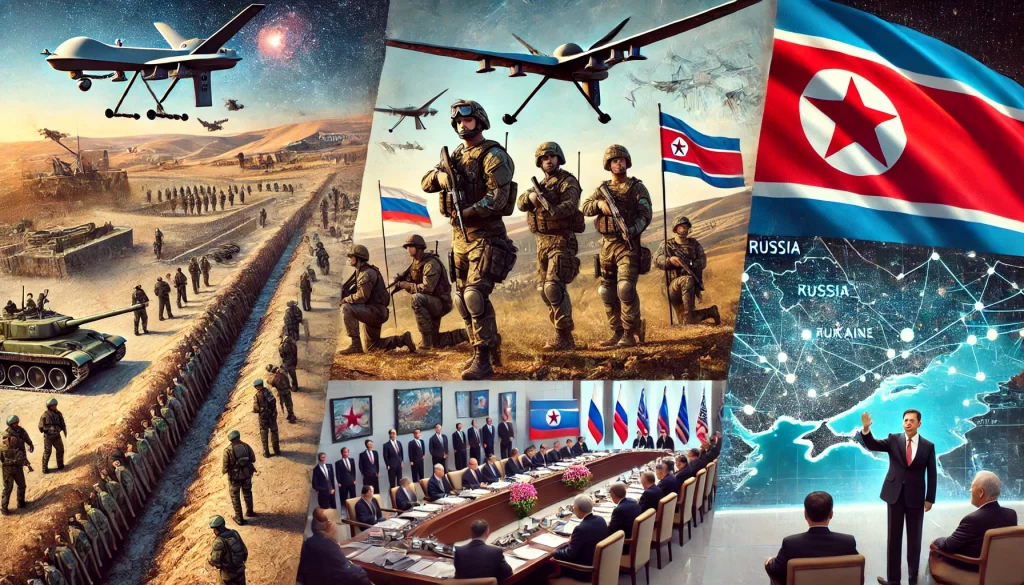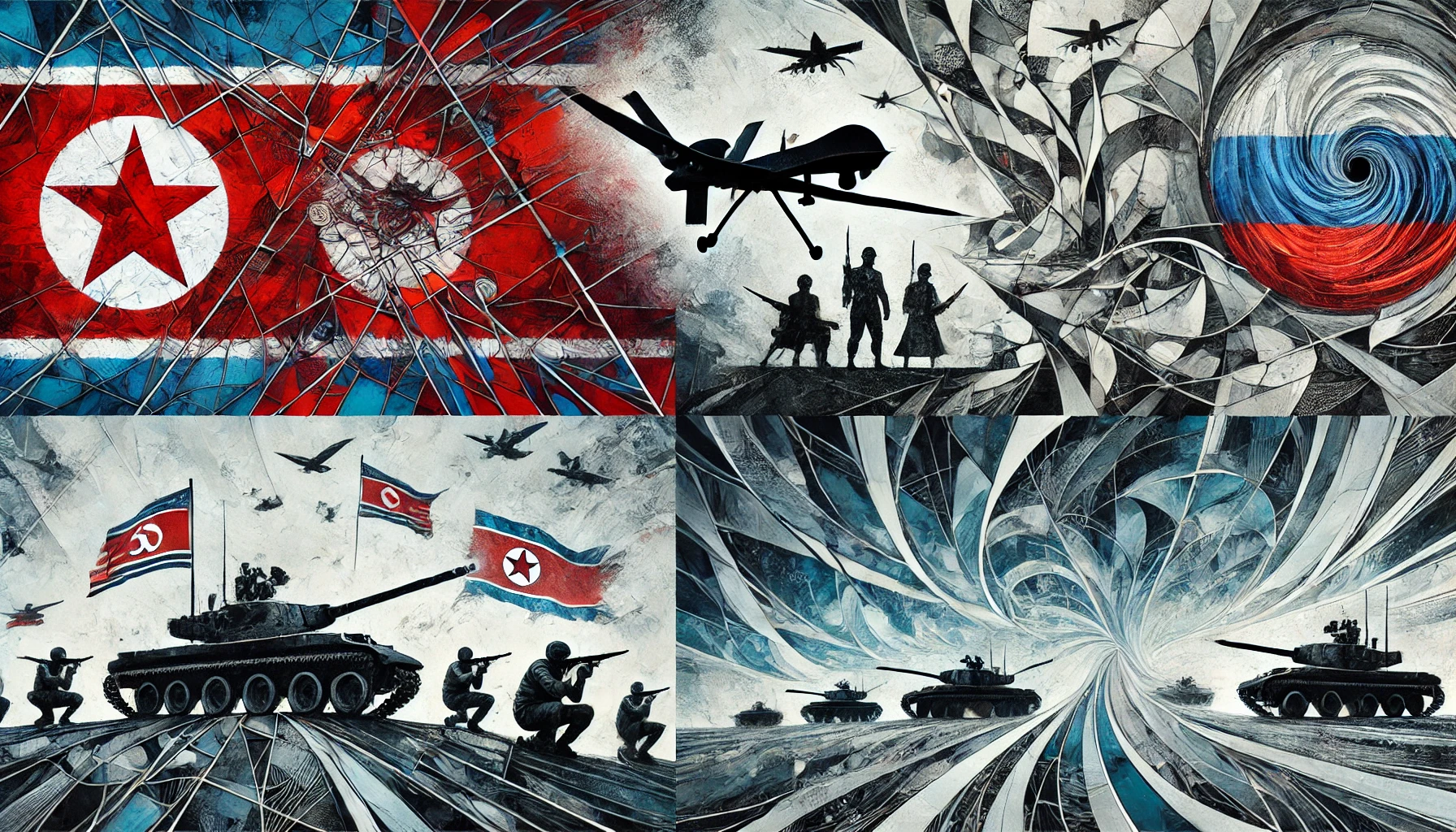North Korean troops deployed to Ukraine to support Russian forces have suffered substantial losses. According to South Korean military intelligence, over 1,000 North Korean soldiers have been killed or wounded in Ukraine, marking their involvement in a major overseas conflict for the first time. The soldiers have faced significant challenges due to their lack of preparation for the realities of modern warfare on unfamiliar terrain.
A Costly Deployment
South Korea’s Joint Chiefs of Staff (JCS) stated that North Korean forces, recently engaged in combat with Ukrainian troops, have experienced approximately 1,100 casualties. Reports indicate that some of the fallen soldiers included high-ranking officers, with one casualty allegedly being a general. Intelligence suggests that their heavy losses are linked to a combination of poor training for modern drone warfare and their use as frontline assault troops in high-risk roles. Lee Seong-kweun, a South Korean lawmaker, explained that North Korean troops are being deployed in ways that make them highly vulnerable to Ukrainian missile and drone attacks.
In the Kursk region of Russia, Ukraine’s military reported that around 30 North Korean troops were killed or wounded in recent clashes, with at least three others reported missing. This area has been a focus of fighting as Russian forces attempt to regain territory lost earlier in the conflict. However, the North Korean troops’ inexperience with open and flat terrain, as well as their lack of live combat experience, has led to difficulties in adapting to the battlefield conditions.
Why North Korea Is Sending Troops
North Korea’s decision to send troops is seen as part of an agreement with Russia aimed at strengthening their alliance. Earlier this year, North Korean leader Kim Jong-un and Russian President Vladimir Putin signed a mutual defense pact during a summit in Pyongyang. Analysts believe that North Korea seeks advanced Russian military technology, including rocket systems, in exchange for sending troops, ammunition, and equipment to aid Russia’s war effort.
The North Korean soldiers deployed to Ukraine are from elite units, such as the “Storm” Corps, which specialize in urban warfare and infiltrations. However, their training has been primarily focused on operations within the Korean Peninsula. Their unfamiliarity with large-scale drone warfare and trench battles has put them at a disadvantage. South Korean intelligence noted that many North Korean soldiers received only basic instruction in Russian military terms like “open fire” and “in position,” leading to communication challenges with Russian forces.
Promises and Risks for Soldiers
For many of these soldiers, the deployment offers potential rewards. Reports indicate that North Korea is offering troops financial compensation and promises of elevated social status for their families. Soldiers are reportedly earning up to $2,000 a month, although most of this is likely taken by the North Korean government. Families of those killed in combat are promised elevated status, which is a significant incentive for individuals from poorer backgrounds. Additionally, surviving soldiers are being offered fast-track membership in the ruling Workers’ Party, a coveted privilege in North Korean society.
Despite these promises, the soldiers face immense risks. Defectors and analysts have described North Korea’s decision as a calculated gamble. While the regime sees this as an opportunity to gain experience in modern warfare, the lack of proper training and the rushed nature of the deployment have led to high casualties.

Global Response and Concerns
The international community has strongly condemned North Korea’s involvement in the war. Ukraine and its allies have urged Pyongyang to withdraw its troops and cease its support for Russia’s invasion. A statement from the U.S. and allied nations called for an end to North Korea’s assistance to Russia, including its troop deployments and weapon shipments.
South Korea has also voiced concerns about the broader implications of this deployment. A JCS statement noted that North Korea may be using the Ukraine war to modernize its military capabilities, which could lead to increased threats against South Korea in the future. In response, South Korea and Ukraine have announced plans to deepen their security cooperation.
Meanwhile, North Korea has dismissed international criticism as “reckless provocation.” Its state media has defended the country’s “normal cooperative” relationship with Russia, accusing the West of distorting and slandering its actions.
Challenges for North Korean Troops
The North Korean troops’ lack of experience in large-scale, modern warfare has been a significant challenge. Analysts noted that these soldiers are accustomed to training for sniper missions and urban combat rather than open-field trench warfare. The rushed deployment, coupled with limited training on the use of drones and other modern military technologies, has left them ill-prepared.
During the COVID-19 pandemic, many North Korean soldiers were assigned to border patrol duties instead of regular training, further impacting their readiness. Their deployment to Ukraine has also been marked by logistical issues, with reports of language barriers and difficulties integrating with Russian forces.
The Larger Context
This deployment marks a significant escalation in North Korea’s involvement in international conflicts. It highlights the deepening relationship between Kim Jong-un and Vladimir Putin as both nations face increasing isolation from the international community. Analysts believe that North Korea sees this alliance as a way to strengthen its military and diplomatic position while gaining valuable combat experience.
Despite the heavy losses, North Korea appears committed to its involvement in Ukraine. The regime views the casualties as an acceptable cost for the potential benefits, including enhanced military capabilities and closer ties with Russia. As one defector explained, “North Korea will take the casualties for granted. It will consider them an inevitable cost of gaining experience in modern warfare.”
This article is based on the following articles:
https://www.nytimes.com/2024/12/23/world/asia/north-korea-military-russia-what-to-know.html

Background Information
1. The Korean Peninsula and North Korea’s Military
North Korea, officially called the Democratic People’s Republic of Korea (DPRK), is a small country located in East Asia. It shares a heavily militarized border with South Korea, its southern neighbor. The two countries have been divided since the Korean War (1950–1953), which ended in an armistice but not a peace treaty, meaning the two nations are technically still at war.
North Korea is a highly secretive, authoritarian state ruled by Kim Jong-un. The country maintains one of the largest standing armies in the world, with 1.3 million active soldiers. Its military prioritizes loyalty to the regime over modern warfare readiness. Soldiers are taught to follow orders without question and are often subjected to harsh discipline and rigorous ideological indoctrination.
2. North Korea’s Isolation and Need for Alliances
North Korea has been politically and economically isolated for decades due to its pursuit of nuclear weapons and human rights abuses. Sanctions imposed by the United Nations and countries like the United States have made it difficult for North Korea to trade with the outside world or access advanced technology. This isolation has forced the country to rely on a few allies, such as China and Russia, for diplomatic and economic support.
Russia and North Korea share a history of cooperation dating back to the Cold War, when the Soviet Union supported North Korea during the Korean War. Today, their relationship is primarily based on mutual interests, such as opposing U.S. influence in global politics. The recent defense pact between Russia and North Korea reflects these shared goals.
3. Why the Ukraine War Matters
The war in Ukraine began in February 2022 when Russia launched a large-scale invasion of Ukraine. This conflict has drawn international attention because it represents one of the largest wars in Europe since World War II. The war has led to widespread destruction, loss of life, and displacement of millions of Ukrainians. It has also created tensions between Russia and Western nations, which have imposed sanctions on Russia and provided military support to Ukraine.
For Russia, the war is about maintaining influence over Ukraine and pushing back against NATO, a military alliance of Western countries. For Ukraine, it is a fight for independence and sovereignty.
4. North Korea’s Role in the War
North Korea’s decision to send troops and weapons to Russia in the Ukraine war is unusual for several reasons. First, North Korea has rarely been directly involved in conflicts outside the Korean Peninsula. Second, the war in Ukraine is geographically and culturally far removed from North Korea, making its involvement notable.
North Korea’s motivations include strengthening its ties with Russia and gaining access to advanced Russian military technology. By helping Russia, North Korea hopes to secure benefits that might improve its own military capabilities.
5. Modern Warfare Challenges
The war in Ukraine has highlighted the importance of modern military technology, such as drones, advanced artillery, and electronic warfare. These technologies have changed how wars are fought, making them more complex and deadly. For countries like North Korea, which have limited experience with modern warfare, adapting to these new realities can be extremely difficult.
North Korean soldiers, for instance, are trained mainly for battles within their mountainous homeland, focusing on guerrilla tactics and urban warfare. Fighting in Ukraine, with its open fields and reliance on drone technology, presents unique challenges that they are unprepared for.
6. The Role of Propaganda and Morale
In authoritarian countries like North Korea, the government uses propaganda to maintain control over its people. Soldiers are often told that their sacrifices will bring glory to their country and leader. Promises of financial rewards or social privileges for families of soldiers are common ways to boost morale and encourage loyalty.
North Korean soldiers deployed to Ukraine are likely motivated by such promises. However, the reality of war, including high casualties and poor conditions, may not match the image portrayed by their government.
7. International Reactions to North Korea’s Involvement
North Korea’s support for Russia has drawn criticism from many countries. Western nations and their allies see it as an attempt to prolong a war that has already caused immense suffering. The United States and European countries have called for North Korea to stop providing troops and weapons to Russia.
This situation has also increased tensions in East Asia, where North Korea’s neighbors, including South Korea and Japan, are closely watching for any signs that North Korea might use its experience in Ukraine to threaten them in the future.
8. Understanding the Stakes
The involvement of North Korean troops in Ukraine is significant because it reflects a broader trend of geopolitical alliances reshaping global conflicts. While North Korea’s contribution may not drastically alter the war’s outcome, it shows how countries like Russia and North Korea are willing to cooperate in ways that challenge international norms.

Debate/Essay Questions
- Should international organizations take stronger action against North Korea for sending troops and weapons to support Russia?
- Does North Korea’s alliance with Russia pose a significant threat to global security?
- How might North Korea’s involvement in Ukraine influence its relationship with neighboring countries like South Korea and Japan?
Please subscribe to Insight Fortnight, our biweekly newsletter!
